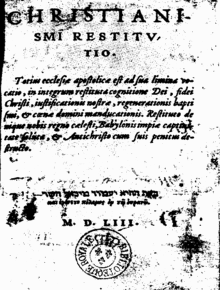Christianismi Restitutio
Christianismi Restitutio ( The Restoration of Christianity ) is the Latin title of a book published in Vienne (France) by the Spanish doctor, scholar and theologian Michel Servet in 1553 . Restitutio is used here in the sense of restitutio in integrum , "re-establishment into the intact".
Content and story
In his writing Servet turns against the dogma of the Trinity and against the doctrine of predestination , which John Calvin had established as essential principles of Christianity in his main work Institutio Christianae Religionis . Servet believed that God does not judge or condemn anyone who does not judge himself by his own thoughts, words, or actions. The chapter on the Holy Spirit contains, for the first time, brief written explanations of the pulmonary circulation , which are based on the discoveries of the medieval Arab doctor Ibn an-Nafīs and contradict the traditional teachings of Galen .
At the beginning of 1546, Servet Calvin sent an unprinted manuscript of the Restitutio , but it was never published. In February 1546 Calvin wrote to his colleague Guillaume Farel that he could not promise Servet a safe conduct if he came to Geneva: “because if he comes here and I still enjoy a certain reputation here, I will not allow him to come out alive . ”The correspondence was soon broken off at Calvin's instigation, and a bitter hostility developed between the two scholars. In January 1553 Servet had his restitution secretly printed in Vienne and was then reported to the Inquisition . As a native of Spain, he had meanwhile become a French citizen and took the name Michel de Villeneuve. Soon after the book was published, Michel de Villeneuve was denounced as a servet by Calvin. He was arrested in Vienne on April 4, 1553, and fled the prison of the bishop's residence on April 7 . He was convicted, burned in effigy with his books in Vienne and fled to Geneva , where he was arrested again on August 12th. In the process that followed, which lasted several months, the authorities of the other reformed cantons were interviewed, who were unanimously convinced of his guilt and the gravity of his case. The Geneva magistrate sentenced Servet to death at the stake on October 27th . The Reformed clergyman Pieter Overd'hage from Ghent was an eyewitness to the execution and is said to have brought the copy of the restitutio , which was burned with Servet, from the flames. Most of the remaining copies of the book were also burned. Three copies have been preserved and are now in the Bibliothèque nationale de France , the library of Edinburgh University and the Austrian National Library .
Servet's medical knowledge became popular 75 years later when William Harvey's major work on the circulatory system was published in 1628.
Individual evidence
- ^ Duden : Restitutio in Integrum
- ^ Leonard W. Levy: Blasphemy: Verbal Offense Against the Sacred from Moses to Salman Rushdie. Chapel Hill: University of North Carolina Press, 1995. ISBN 978-0-8078-4515-8 , p. 65.
- ↑ Uwe Plath: The Servet case and the controversy about freedom of belief and conscience. Castellio, Calvin and Basel 1552–1556. Alcorde Verlag, Essen 2014.
- ↑ Grzegorz Wierciochin: Écrire contre l'intolérance: l'Historia de Morte Serveti de Sébastien Castellion . In: Studia Romanica Posnaniensia 42 (2015), p. 99, note 6.
literature
- Francis Higman: Michel Servet. In: Historical Lexicon of Switzerland .
Web links
- Sophie von Allersleben: The Man Who Was Burned Twice Magazine for practical philosophy
- Review of the bilingual edition (Latin-French)
